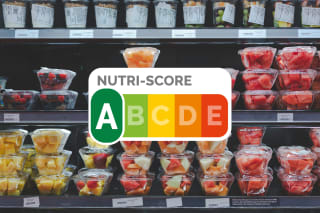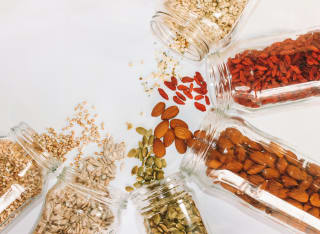Advantages and disadvantages of a vegetarian diet
June 18, 2024
Germans like to eat meat and sausage, but the proportion of those who eat meat or sausage daily has decreased from 34% in 2015 to 20%[1]. This is very pleasing, as it has been proven that daily consumption of red meat can reduce a person's life expectancy by several years. In 2023, 8% of Germans ate vegetarian and 2% even vegan[1].
What does this actually mean and what are the advantages and disadvantages of a vegetarian diet?
Contents
What is a vegetarian diet?

A vegetarian diet is a way of eating in which no animal meat products such as beef, pork, poultry, fish and other seafood are consumed. There are different forms of a vegetarian diet that differ in the degree of restriction of animal products:
- Lacto-Ovo-Vegetarianism: This form of a vegetarian diet excludes meat and fish but allows the consumption of eggs (Ovo) and dairy products (Lacto).
- Lacto-Vegetarianism: Lacto-vegetarians avoid meat, fish and eggs but consume dairy products.
- Ovo-Vegetarianism: Ovo-vegetarians do not eat meat products, fish or dairy products but consume eggs.
- Veganism: A vegan diet goes beyond vegetarianism and excludes all animal products and by-products, including meat, fish, eggs, dairy products, honey and gelatin.
- Pescatarianism: This is a variant where people avoid meat but eat fish and seafood.
Vegetarians mainly eat plant-based foods such as fruits, vegetables, grains, legumes, nuts and seeds. People who eat vegetarian do so for ethical considerations, environmental aspects, health benefits or simply a personal preference or disgust for animal products.
Nothing will increase the chance of survival on earth as much as the step to a vegetarian diet.
Albert Einstein
What are the advantages of a vegetarian diet?
A vegetarian diet offers numerous advantages for health, the environment and animal welfare. Here are some of the most important advantages:
Health Benefits
- Reduced risk of chronic diseases:
-
Better weight control:
- Vegetarians often have a lower body mass index (BMI) and are less prone to obesity.[6]
-
Improved digestion:
- A diet rich in fiber from fruits, vegetables and whole grain products promotes healthy digestion and can prevent constipation.
-
Lower cholesterol levels:
- Vegetarian diets are generally low in saturated fats and cholesterol, which can lead to healthier cholesterol levels.[6]
-
Better nutrient supply:
- A balanced vegetarian diet is rich in important nutrients such as vitamins, minerals and antioxidants.
Environmental Benefits
-
Reduced carbon footprint:
- The production of plant-based foods causes fewer greenhouse gases compared to animal husbandry[9].
-
Lower water consumption:
- Growing plants generally requires less water than meat production. Calculate your water footprint at waterfootprint.org.
-
Biodiversity conservation:
- A vegetarian diet can contribute to biodiversity conservation by using less land for livestock farming and feed production.
Ethical Benefits
-
Animal welfare:
- By avoiding meat products, animals are protected from the often cruel conditions of factory farming.
-
Sustainability:
- A plant-based diet is more sustainable and can help ensure global food supply for all people in the world.
Summary
A vegetarian diet offers significant benefits for health, contributes to environmental protection and supports ethical considerations regarding animal welfare. It promotes a healthier life, a more sustainable lifestyle and better treatment of animals.
What are the disadvantages of a vegetarian diet?
A vegetarian diet has many advantages but can also bring some disadvantages and challenges. Here are some of the possible disadvantages:
Health Disadvantages
-
Nutrient deficiency:
- Vegetarians must ensure they get enough nutrients that are mainly found in animal products, such as vitamin B12, iron, zinc, calcium and omega-3 fatty acids.[6]
- Without careful planning, deficiencies can occur that can cause health problems, such as anemia (iron deficiency) or osteoporosis (calcium deficiency)[10].
-
Protein deficiency:
- Although there are many plant-based protein sources, vegetarians must ensure they get enough proteins and all essential amino acids.
- Some plant-based protein sources are incomplete, meaning they do not contain all essential amino acids in sufficient quantities.
Social and Cultural Disadvantages
-
Limited selection in restaurants:
- In many restaurants and at social events, the selection of vegetarian dishes can be limited, making it difficult to find suitable meals. In Germany, the selection is very good, but abroad the selection can be more limited.
-
Social pressure:
- Vegetarians can encounter incomprehension or rejection in social situations, especially in cultures or communities where meat plays a central role in nutrition.
Practical Disadvantages
-
Increased costs:
- Some vegetarian products, especially special meat substitute products or organic foods, are often more expensive than conventional alternatives.
-
Increased effort in meal planning:
- A balanced vegetarian diet requires careful planning and preparation to ensure that all necessary nutrients are consumed.
- It can be time-consuming to find and prepare new recipes, especially when adapting to a new way of eating.
Psychological Aspects
-
Giving up beloved foods:
- People who are new to a vegetarian diet may have difficulty giving up certain meat dishes they are used to and enjoy eating.
Summary
While a vegetarian diet offers many health and environmental benefits, there are also potential disadvantages. However, these can be largely avoided or minimized through careful planning and conscious nutrition. It is important to inform yourself well and, if necessary, seek advice from nutrition professionals to ensure that all nutritional needs are met.
Who needs to be especially careful with a vegetarian diet?
Certain people must pay special attention to their nutrient intake when following a vegetarian diet to ensure they receive all necessary nutrients in sufficient quantities. Here are some groups that should be especially careful:
Pregnant and breastfeeding women
-
Increased calorie and nutrient needs:
- During pregnancy and breastfeeding, the need for certain nutrients such as protein (milk production), iodine, iron, vitamin B12 and omega-3 fatty acids is increased.
-
Careful planning:
- Pregnant and breastfeeding women should plan their diet carefully and possibly take dietary supplements to ensure that they and their baby are adequately supplied with nutrients. If you would like professional advice, you can find your personal nutrition specialist on KoaVie here.
Children and adolescents
-
Growth phase:
- Children and adolescents are in an important growth and development phase and need adequate intake of calories, proteins and micronutrients.
-
Nutrient density:
- Parents should ensure that their children's diet is nutrient-dense and contains all necessary vitamins and minerals.
Seniors
-
Changed nutrient needs:
- Older people often have a lower calorie requirement but still need a high nutrient intake.
-
Nutrient deficiencies:
- Seniors can be more susceptible to nutrient deficiencies, especially for vitamin B12, vitamin D, calcium and protein.
Athletes
-
High energy needs:
- Athletes have increased energy and nutrient needs, especially for proteins to support muscle building and repair.
-
Nutrient supplementation:
- They should ensure that their vegetarian diet provides sufficient calories and nutrients to support their performance and recovery.
People with certain medical conditions
-
Gastrointestinal diseases:
- People with diseases such as Crohn's disease or celiac disease may have limited nutrient absorption and must plan their diet particularly carefully.
-
Anemia:
- People who are prone to anemia should pay attention to adequate iron and vitamin B12 intake.
People with food allergies or intolerances
-
Limited food selection:
- People with allergies to certain foods such as soy, nuts or gluten must take additional precautions to ensure they still receive all necessary nutrients.
People switching to a vegan diet
-
Comprehensive nutrient needs:
- Vegans must pay special attention to the intake of nutrients that are mainly found in animal products, such as vitamin B12, vitamin D, calcium, iron, zinc and omega-3 fatty acids.
Summary
A well-planned vegetarian diet can be healthy and balanced, but certain people must pay special attention to their nutrient intake. It can be helpful to consult a nutritionist or doctor to ensure that all nutritional needs are met.
How can I start eating vegetarian?
Switching to a vegetarian diet can be a positive change for your health and well-being. Here are some steps that can make the transition easier:
-
Inform yourself
- Read about vegetarian nutrition: Books, articles and scientific studies can help you understand the basics of a balanced vegetarian diet.
- Nutritional counseling: Consult a nutritionist to ensure that your diet contains all necessary nutrients. Find your personal nutrition specialist here on KoaVie.
-
Plan your meals
- Create a meal plan: Plan your meals in advance to ensure they are balanced and nutrient-rich.
- Nutrient-rich foods: Make sure to get enough protein, iron, calcium, vitamin B12, vitamin D and omega-3 fatty acids. Good sources are legumes, nuts, seeds, whole grains, fruits and vegetables.
-
Gradual transition
- Reduce gradually: If you don't want to go completely vegetarian immediately, gradually reduce meat consumption. Start with meat-free days and gradually increase the number of these days.
- Substitute products: Try meat substitute products such as tofu, tempeh, seitan and plant-based burgers.
-
Experiment with recipes
- Try new recipes: Look for vegetarian recipes that you might like. Experiment with different ingredients and cooking techniques.
- Learn to cook: If you enjoy cooking, this is a great opportunity to develop new cooking skills and discover new flavors.
-
Supplement your diet
- Dietary supplements: In some cases, it may make sense to take dietary supplements, especially for vitamin B12, vitamin D and omega-3 fatty acids.
- Fortified foods: Choose fortified foods such as plant-based milk, cereals and juices that are enriched with important nutrients.
-
Social support
- Find community: Join vegetarian groups or forums to get support and tips from like-minded people.
- Family and friends: Inform your family and friends about your decision and ask for support.
-
Meal planning on the go
- Be prepared: Pack healthy snacks and plan ahead when eating out to ensure you have vegetarian options.
- Restaurant research: Find out about vegetarian options in restaurants before you go out.
-
Listen to your body
- Pay attention to your body: Every person is different. Pay attention to how your body reacts to the dietary change and adjust your diet if necessary.
- Regular health checks: Have your blood values checked regularly to ensure you don't develop deficiencies.
Summary
The transition to a vegetarian diet requires planning, experimentation and conscious food choices. Inform yourself, plan your meals, and seek support from family, friends or in the community. Over time, you will find that a vegetarian diet can be not only healthy but also diverse and enjoyable.

Sources
- Federal Ministry of Food and Agriculture, Nutrition Report 2023
- Xiao Gu et al., Red meat intake and risk of type 2 diabetes in a prospective cohort study of United States females and males, 2023, https://doi.org/10.1016/j.ajcnut.2023.08.021.
- Pan et al., Red meat consumption and mortality: results from 2 prospective cohort studies, 2012, 10.1001/archinternmed.2011.2287
- Timothy J Key et al., Mortality in vegetarians and nonvegetarians: detailed findings from a collaborative analysis of 5 prospective studies, 1999, https://doi.org/10.1093/ajcn/70.3.516s
- Farvid MS et al., Consumption of red and processed meat and breast cancer incidence: A systematic review and meta-analysis of prospective studies, 2018, 10.1002/ijc.31848
- Davey GK et al., EPIC-Oxford: lifestyle characteristics and nutrient intakes in a cohort of 33,883 meat-eaters and 31,546 non meat-eaters in the UK, 2003, 10.1079/PHN2002430
- Orlich MJ et al., Vegetarian dietary patterns and mortality in Adventist Health Study 2, 2013, 10.1001/jamainternmed.2013.6473
- Sinha R et al., Meat intake and mortality: a prospective study of over half a million people, 2009, 10.1001/archinternmed.2009.6
- Ivanovich et al., Future warming from global food consumption, 2023, 10.1038/s41558-023-01605-8
- Tong et al., Vegetarian and vegan diets and risks of total and site-specific fractures: results from the prospective EPIC-Oxford study, 2020, 10.1186/s12916-020-01815-3




